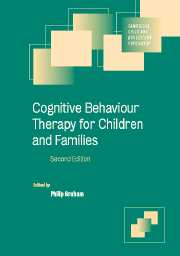Book contents
- Frontmatter
- Contents
- List of contributors
- 1 Introduction
- Part I Developmental cognitive theory and clinical practice
- Part II Engagement and assessment
- Part III Client groups
- Part IV Applications in psychosocial adversity
- Part V Applications in specific child and adolescent psychiatric disorders
- 12 Behavioural approaches to eating and sleeping problems in young children
- 13 Conduct disorders in young children
- 14 Attention deficit hyperactivity disorder
- 15 Children with developmental disabilities and their parents
- 16 Depressive disorders
- 17 Cognitive behavioural psychotherapy for obsessive compulsive disorders
- 18 Anxiety disorders
- 19 School refusal
- 20 Post-traumatic stress disorders
- 21 Disorders of eating control
- 22 Chronic fatigue syndrome
- 23 Children's interpersonal problems
- 24 Pain in childhood
- 25 Conduct disorders in adolescence
- 26 Drug and alcohol abuse
- Part VI CBT applications in preventive interventions
- Index
- References
23 - Children's interpersonal problems
Published online by Cambridge University Press: 21 August 2009
- Frontmatter
- Contents
- List of contributors
- 1 Introduction
- Part I Developmental cognitive theory and clinical practice
- Part II Engagement and assessment
- Part III Client groups
- Part IV Applications in psychosocial adversity
- Part V Applications in specific child and adolescent psychiatric disorders
- 12 Behavioural approaches to eating and sleeping problems in young children
- 13 Conduct disorders in young children
- 14 Attention deficit hyperactivity disorder
- 15 Children with developmental disabilities and their parents
- 16 Depressive disorders
- 17 Cognitive behavioural psychotherapy for obsessive compulsive disorders
- 18 Anxiety disorders
- 19 School refusal
- 20 Post-traumatic stress disorders
- 21 Disorders of eating control
- 22 Chronic fatigue syndrome
- 23 Children's interpersonal problems
- 24 Pain in childhood
- 25 Conduct disorders in adolescence
- 26 Drug and alcohol abuse
- Part VI CBT applications in preventive interventions
- Index
- References
Summary
Children and adolescents present for therapy seeking assistance with a range of cognitive, behavioural and affective difficulties. Frequently, these difficulties are associated with, are the result of or at least contribute to difficulties in interpersonal relationships. Consequently, the improvement of social interaction is often a target of child and adolescent psychological interventions. Social competence is defined in this chapter as the ability to obtain successful outcomes from relationships with others. There are many reasons why a child may demonstrate deficiencies in social competence and, therefore, experience interpersonal problems. The initial section of this chapter outlines a number of these potential causal and maintaining factors and examines various approaches to the enhancement of children's social competence. The chapter then proceeds with an examination of the effectiveness of social skills training (SST) with children and its strengths and limitations. Finally, social skills assessment and the practical aspects of SST are discussed.
Factors that influence children's social competence
There are many reasons why a child may experience interpersonal problems and difficulties in social competence. The most proximal determinants of children's social competence relate to their actual behaviour within a social situation. This behaviour, however, is determined by many factors. In particular, the child's ability to engage in effective social–cognitive processes will strongly influence the way in which a child behaves. Thus, social perception and social problem-solving skills play a key role in determining how a child responds in a social situation.
- Type
- Chapter
- Information
- Cognitive Behaviour Therapy for Children and Families , pp. 402 - 425Publisher: Cambridge University PressPrint publication year: 2004



